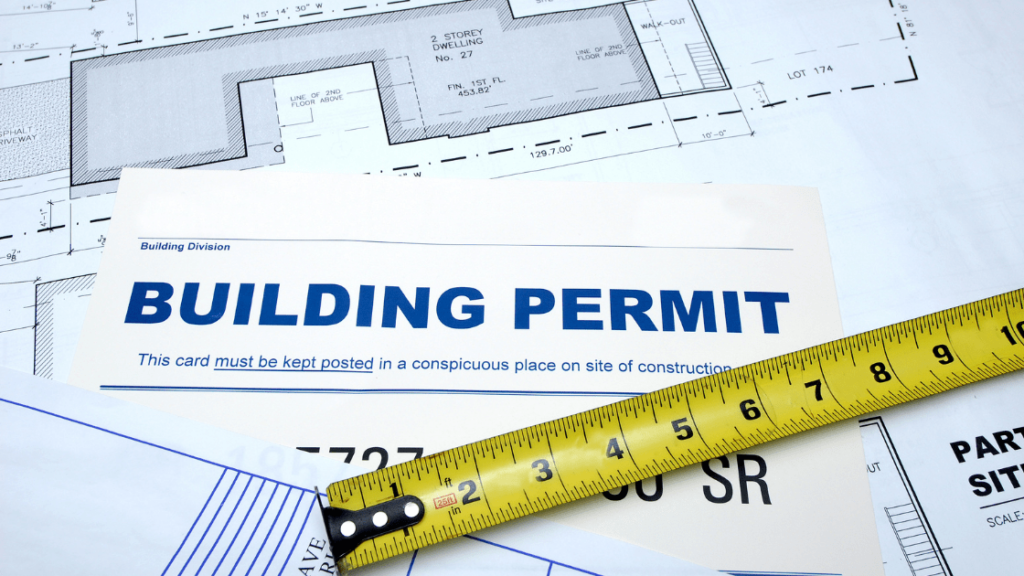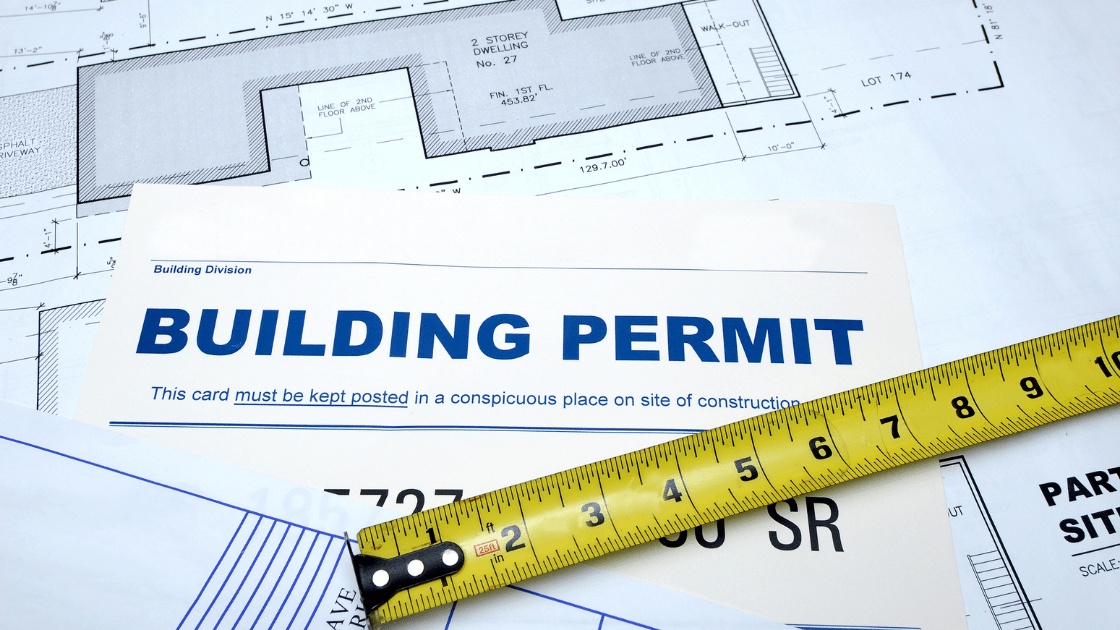
Discovering an open permit on your home can pose additional costs and delay the original timeline of your sale. Title companies or real estate attorneys don’t always catch open permits on a property, leading to further delays throughout the closing process.
Below, we’ll cover what an open permit is, how it may impact your home sale and your options for selling your home with an open permit in Massachusetts.
Understanding Open Permits
An open permit refers to a specific type of authorization granted by your local county or municipal government for home improvement projects. It is termed ‘open’ because it has not yet been finalized and officially closed out by the governing authority.
Despite being critical documents, open permits often present a hurdle as they generally do not appear on title searches. This invisibility can potentially lead to complications when selling a property or conducting other real estate transactions.
Types of Projects Requiring Permits
Your local government is responsible for issuing permits for an extensive array of home improvement projects. These projects usually involve significant changes or additions to the existing property infrastructure. The following are common examples:
- Building an addition: This includes extending the living space of your home, such as adding new rooms or expanding existing ones.
- Pool installation (in-ground and above-ground): Both types of pools typically require a permit due to safety regulations and zoning restrictions.
- Demolishing load-bearing walls: This kind of structural alteration can affect the stability of the building and thus requires official approval.
- Altering the layout of the home: Any major modifications to your home’s floor plan will most likely need a permit.
- New electrical wiring: Electrical work often involves strict safety codes and requires professional inspection upon completion.
- Fences and decks over a certain height: Depending on your local regulations, tall fences and decks may need a permit for construction.
- Changes to the sewer line: Any alterations to plumbing systems, including sewer lines, typically require inspection.
- Adding a garage: Building any new structures on your property, such as a garage, will likely necessitate a permit.
- Installing fireplaces or wood-burning stoves: Due to potential fire hazards, these installations usually require official permission.
- Cutting down a tree: Some areas have protection laws for certain types of trees, making a permit necessary for their removal.
- Replacing the water heater: Given the potential risks associated with improper installation, this task often requires a permit and subsequent inspection.
The Role of Government
The government plays a crucial role in monitoring these projects. It ensures that all local zoning restrictions are adhered to and safety standards are met. By issuing permits, the local authority can maintain the quality of housing within its jurisdiction and ensure the well-being of residents.
How to Check for Open Permits on a Property in Massachusetts
If you’re planning to sell your property in Massachusetts, it’s essential to ensure there are no open permits. Here’s how to check for open permits on your property.
Step 1: Contact Your Local Building Department
The first step is to contact the local building department in the town or city where your property is located. This is typically the department that issues permits for construction and other major changes to properties.
- Phone or Email: Most departments can provide information over the phone or via email. Be ready to provide your property address and any other necessary details.
- In-Person Visit: Alternatively, you might need to visit the office in person if they do not provide this service remotely.
- Online Portal: Some municipalities have online portals where you can search for permit records.
Step 2: Request a Property History Report
A Property History Report often includes information about past permits issued for a property. It can also provide details about any violations that may have occurred.
Step 3: Review the Open Permit Information
Once you have access to the permit records, scrutinize them carefully. Identify any open (unresolved) permits and make note of what work was permitted but not finalized.
Important Note: An open permit isn’t necessarily a problem, but if work was done without proper inspections or final approval, it could lead to issues later on.
Step 4: Resolve Any Open Permits
If there are any open permits associated with your property, you’ll need to take steps to resolve them before selling.
- The process may involve arranging for inspections of previous work.
- If work wasn’t completed according to code, you might need to arrange for corrections before the permit can be closed.
Step 5: Obtain Documentation
Once all permits are resolved, request documentation from the building department. This will provide proof that all permits have been properly closed, which can be a selling point for potential buyers.
By following these steps, you can avoid unnecessary complications during the sale process and ensure a smooth transaction.
Selling a House with an Open Permit in Massachusetts
In recent years, many local governments have implemented stricter regulations on open permits. This has important implications for homeowners looking to sell their property. Before you put your house on the market, it’s essential to understand the potential complications that might arise from any unresolved permits.
The Impact of Open Permits on Property Sales
Firstly, you may be required by law to resolve all open permits before you can sell your property. Local authorities often impose this requirement to ensure that all buildings within their jurisdiction comply with safety standards and zoning restrictions.
Secondly, open permits can pose a significant obstacle during the closing process. Title companies and mortgage lenders often play a crucial role at this stage. If they discover an open permit on your property, they may advise the buyer against proceeding with the transaction.
Taking Proactive Steps
Given these potential pitfalls, it’s advisable to conduct thorough research into any possible open permits on your property. You might be surprised to find that there’s an unresolved permit which you weren’t previously aware of.
Here are some steps you can take:
- Contact your local government: They should have records of any permits associated with your property.
- Consult with the original contractors: If feasible, reach out to any contractors who have worked on your house in the past. They may have information about any outstanding permits.
- Seek professional advice: Consider engaging a real estate lawyer or agent who is familiar with local regulations and can guide you through the process.
By taking these proactive steps early in the sales process (or even before listing your property), you can potentially avoid delays and ensure a smoother transaction.
In summary, when selling a house in Massachusetts or elsewhere, it’s crucial to consider the implications of open permits. Being proactive and thorough can save you from potential hurdles down the line.
Step-by-Step Guide on How to Close an Open Permit on a House
Navigating the process of closing open permits can be complex and time-consuming. However, it is a crucial step to ensure a seamless property sale process. Here, we break down this process into manageable steps for you.
1. Identify Any Open Permits
The initial step involves reaching out to your local government to ascertain if there are any open permits associated with your property. This can typically be done through the local government’s website or by visiting their office.
2. Seek Guidance from Local Government
If your investigation reveals open permits, you should then contact your city or town for further guidance. Since regulations and procedures for resolving open permits can vary widely depending on your location, it’s crucial that you seek advice from the relevant local authority.
Note: It’s vital to have all the necessary information at hand when contacting your local government. Details such as the permit number, issued date, and nature of work covered by the permit will be useful.
3. Consult with Original Contractors
Next, get in touch with the contractors who carried out the work associated with the open permit(s). Normally, it’s the contractor’s responsibility to both open and close permits for their projects.
By following these steps diligently, you stand a better chance of resolving any open permits, thereby paving the way for a smoother property sale process.
The bottom line
Though discovering open permits on your property is inconvenient, it isn’t the end of the world. You can choose to resolve the permits by contacting your local government and contractor. If you don’t want to deal with the hassle, you can list the open permit on a seller’s disclosure or sell as-is to a real estate investor.
We’ll buy your home with open permits in Massachusetts
Resolving open permits on your home can be time-consuming and stressful. We know you want to sell as quickly as possible, which is why we’ll pay cash for your house in any condition. We’ll also take care of any open permits on the property to make the process as easy for you as possible.
Ready to sell your home fast for cash? Give us a call at 781-309-7085 to speak with a member of our team or get your fast cash home offer online today.

